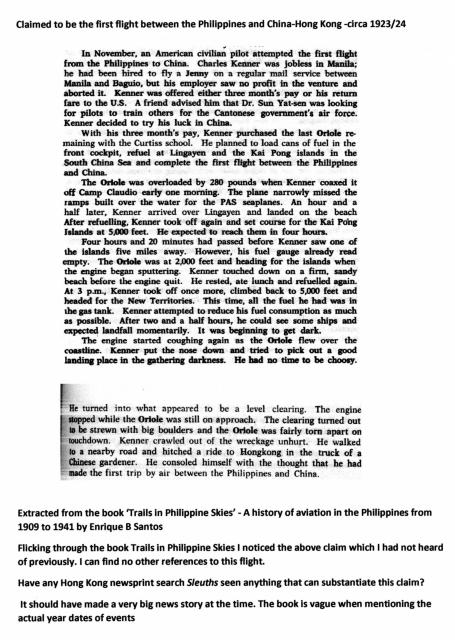Flicking through the book Trails in Philippine Skies I noticed the above claim which I had not heard of previously.
I can find no other references to this historic flight.
Have any Hong Kong newsprint search Sleuths seen anything that can substantiate this claim?
It should have made a very big news story at the time. The book is somewhat vague when mentioning the actual year dates of events
Date picture taken
15 Jun 1924
Gallery

Comments
Re: Flight
A difficult one to search for. There is partial information here from another book reference. Piecing together the book review snippets, this is the information that can be gleaned:
On Page 101. "His father was a major in the British Army and, as soon as Charles was old enough, sent his son to England to receive the obligatory public school education at Wellington College. Here, at the age of 16, Charles sustained a fractured skull...based at Nicholls Field in the Philippines, where he flew de Havilland D.H.4Bs. There he again fell out with authority and decided to desert by flying from Luzon to Kowloon in Hong Kong, a journey of some 680 miles, in a Curtiss Oriole, a solo flight not previously accomplished. ... After crash landing near Hong Kong he then found his way to Canton, where for some time during 1923-24, he was a flying instructor for the A.."
On Page 102, a name is given "Charles Kenneth Apjohn Carter". He wrote the "Stormy Petrel". Cross-referencing turns up interesting information as noted here and here He appears well travelled as noted here and here
Not sure if the "Charles" mentioned on both pages of the book are the same person.
Looked through the newspapers of the day, there does not appear to be such a crash after a long sea journey.
PI to HK flight
Moddsey
Thank you for that comprehensive and widespread search
The more I read, the less I believe the original claim of Kenner flying from the Philippine Islands to China.
From the various reports, he appears to have been a first-class grade fantasist, rogue and self-proclaimed “rotter.”
He could have been absorbed seamlessly into Hong Kong ‘society’ even today.
The Curtiss Oriole aircraft claimed to be used was a two-seat light-weight bi-plane training aircraft. In fact, the same type Harry Abbott shipped up from the Philippines for his Abbott School of Aviation based at Kai Tack Field.
Charles Kenner would have had to been superb navigator to find his refuelling stop islands, and a very careful pilot to be able land on unknown beaches with large quantities of his remaining liquid fuel supplies in cans in his front cockpit. Perhaps a retired Mariner with access to high-grade charts of the South China Sea could try and locate these islands and their relevant distances to see if they in fact exist?
Without positive mentions in Hong Kong or North China newspapers I’m inclined to discount the claim and place it in the “Myths and Legends” file. Certainly, there are no mentions in relevant China Year Books “Aviation” section’s reports. The Flight Global archive also appears to have no contemporary magazine news reports of the flight.
There was another 1920s fantasist flyer, a Chinese ‘chancer’, who has no obvious Hong Kong connection, but fooled many people in America into donating money towards saving lives during China’s civil wars and his own attempt to be the first man to fly across the Pacific Ocean. In 1929, Tien Lai- huang passed himself off as the ‘Chinese Lindbergh’ as he flew around the country in a Ryan aircraft named the “Spirit of Canton” emblazoned with Chinese emblems, he even met the US President, made fund raising tours etc. Newsprint stated that he had attended not only Harvard and Columbia universities but also Oxford! He never actually left the USA and ended up in gaol in one of the southern States. He continues to fool researchers into Chinese aviation history.
Stormy Petrel - Charles Kennett
To finish off about the fantasized flight from the Philippines, links from Flight Global here and from the Singapore Press here
Charles Kennett
Thanks’ for the further info
He certainly seems to be a character who should be the subject of a movie.